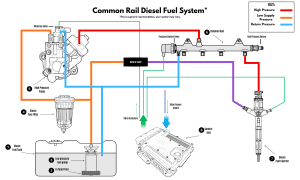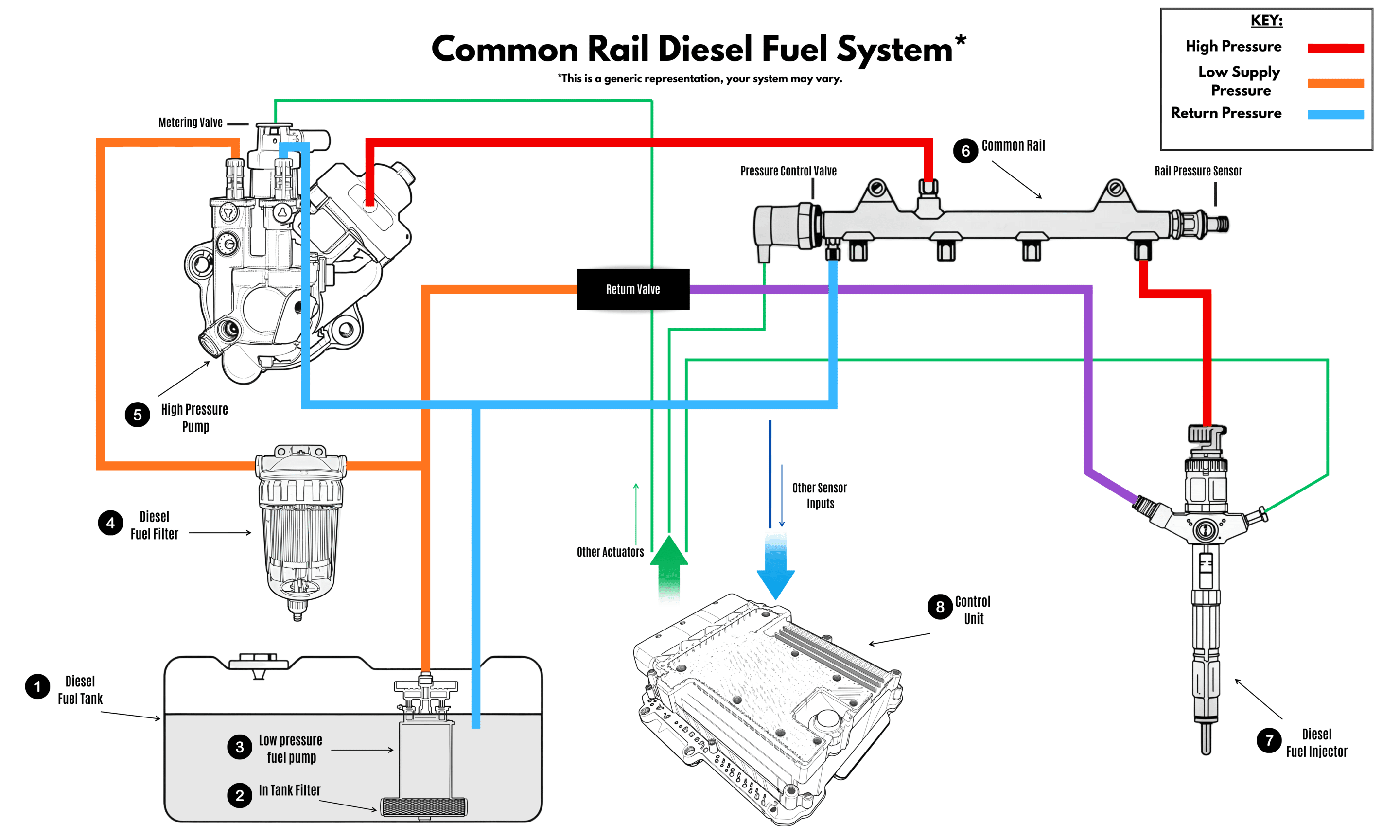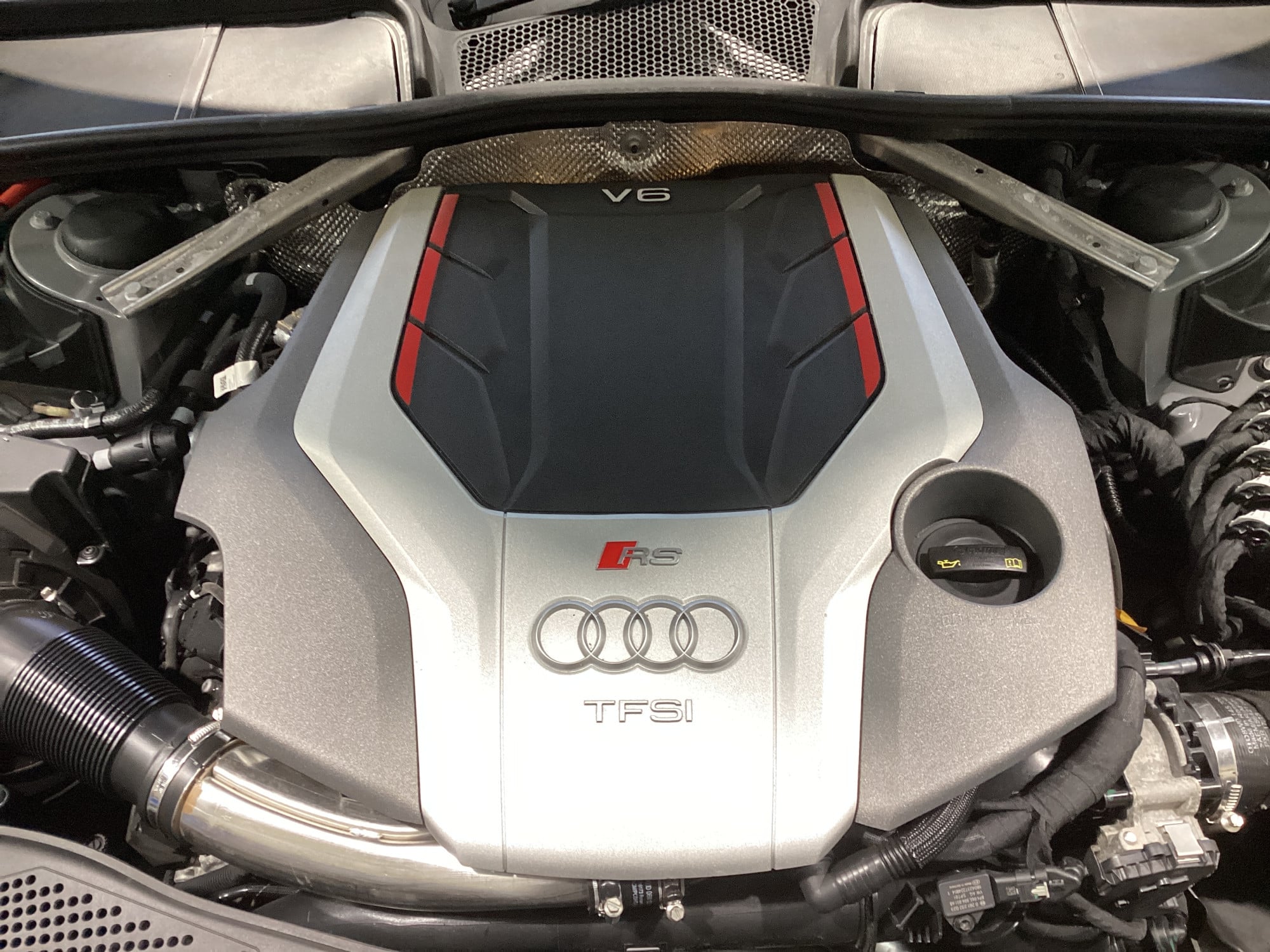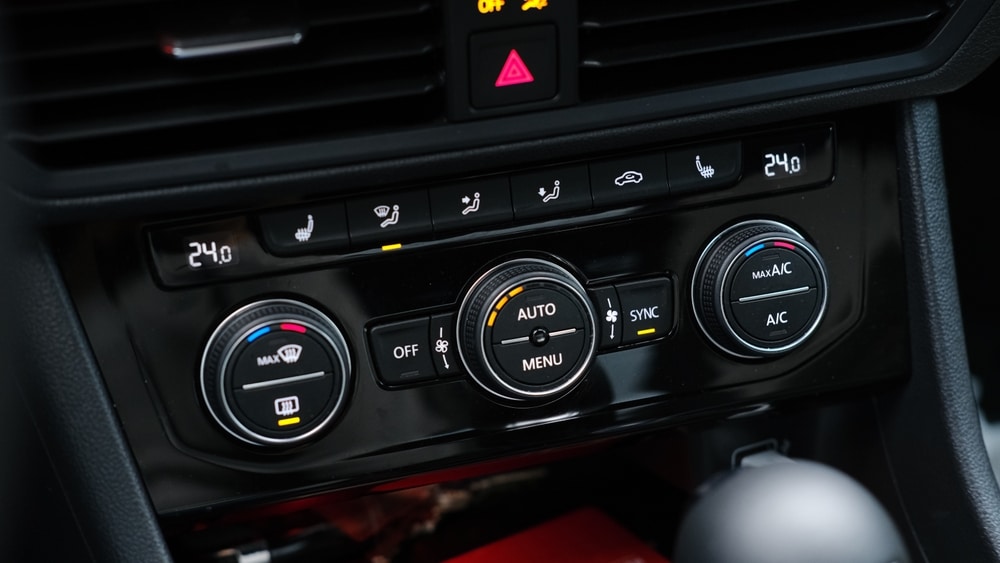How Your Diesel Fuel System Works
A fault with your diesel fuel system might seem minor at first, but it can quickly turn into an expensive repair.
This system is one of the most important in your vehicle, responsible for delivering fuel to the engine so combustion can happen. Without it, your car wouldn’t even run.
Modern diesel fuel systems are built with advanced precision. They manage pressure and fuel flow to provide the mix of performance, efficiency, and reliability that drivers rely on every day.
However, as the system operates at an extremely high pressure, even minor issues like skipping your servicing or accidentally filling the tank with petrol can cause significant damage… Which can cost you thousands.
During this article, you’ll discover how your diesel fuel system works, what can go wrong if it’s neglected, and why keeping up with servicing is one of the simplest ways to avoid repair bills that run into the thousands.
Not sure when your diesel fuel system was last serviced? Call Ystrad Service Centre in Ystrad Mynach today on 01443 540460 and our team will be happy to help.
How the Diesel Fuel System Functions
There are several kinds of diesel fuel systems, but most modern engines use what’s called a common rail diesel fuel system.
Although specific designs can differ, the principle remains the same: a high-pressure rail supplies fuel to all injectors, ensuring steady delivery and precise combustion timing.
The system can be divided into two main parts:
- Low-pressure side: Fuel is pumped from the tank, passes through filters, and is sent to the high-pressure pump. The purpose is to make sure the pump receives clean fuel, free from water or contaminants, at the correct supply pressure.
- High-pressure side: The high-pressure pump then raises the pressure significantly and delivers the fuel into the rail, which stores it until the injectors atomise it into the engine cylinders at the exact point required for combustion.
In simple terms, the diesel fuel system ensures your engine consistently receives clean, pressurised fuel to keep it running efficiently.
A Closer Look at Your Diesel Fuel System
Now that we’ve covered the overall process, let’s focus on the main components of the diesel fuel system. Each part has its own role, and together they ensure the engine runs smoothly and reliably.

Inside the Low-Pressure Side of a Diesel Fuel System
Fuel Tank & Low-Pressure Fuel Pump
The process begins in the fuel tank (part 1 of image). From here, a low-pressure pump (part 3 of image) moves diesel towards the high-pressure stage, ensuring a steady and reliable supply for the rest of the system.
Diesel Fuel Filter
Before reaching the more advanced components, the fuel passes through filters (parts 2 and 4 of image). These remove dirt and separate out water, both of which naturally occur in diesel and can cause costly problems if they reach the pump or injectors.
High-Pressure Side of the Diesel Fuel System
High-Pressure Pump
After filtration, the diesel enters the high-pressure pump (part 5 of image). Its role is to raise the pressure to the extremely high levels required for injection into the engine, around 1800 Bar.
Metering and Pressure Control Valves
Two valves manage the process with accuracy:
- The metering valve controls how much fuel moves into the high-pressure stage.
- The pressure control valve ensures the rail holds the optimal pressure to meet the engine’s needs.
Fuel Rail
The fuel rail (part 6 of image) acts as a high-pressure reservoir. It keeps the supply stable and ensures diesel is evenly distributed to each injector.
Diesel Injectors
The injectors (part 7 of image) are at the end of the system. With nozzle holes as fine as a human hair, they spray the fuel into the engine in a fine mist at precisely the right moment for combustion.
What Makes Diesel Fuel Systems Stand Out
At first glance, the diesel fuel system may look like nothing more than an arrangement of pumps, valves, and pipes. In reality, it’s an advanced design built for accuracy and efficiency.
A few key features make it stand out:
- High precision under pressure: By combining low-pressure delivery with extremely high-pressure injection, the system can supply the optimal amount of diesel in milliseconds, enabling efficient combustion.
- Engineering accuracy: Every element, from the pumps and filters to the injectors, is designed to work with exact timing and measurement. This gives smoother running, better fuel economy, and consistent performance.
- Impact of contamination: Because of this precision, even small amounts of dirt or water can cause corrosion or wear. Replacing filters on time and using quality fuel are simple but important steps to protect the system.
When maintained correctly, the diesel fuel system supports dependable performance. If neglected, even minor issues can escalate into major repair bills – and that’s the last thing you want for your diesel vehicle… And your bank balance.
What Happens If Your Diesel Fuel System Is Neglected
Your car’s diesel fuel system operates with extreme pressure and accuracy; skipping routine maintenance can quickly lead to significant problems, which can leave you with a hefty repair bill.
The most common risks include:
- Missed filter changes: Diesel filters trap dirt and remove water that naturally occurs in fuel. If they aren’t replaced on time, contaminants can move through the pumps and injectors, causing wear throughout the system.
- Low-quality fuel: Cheaper or contaminated diesel often contains higher levels of water and impurities, which accelerate corrosion in the high-pressure pump, common fuel rail, and injectors.
- Spread of contamination: Once debris or water enters the system, it circulates everywhere. Simply replacing one component won’t solve the problem if the root cause remains.
Compared with the cost of repairing a damaged system, replacing a diesel fuel filter is a straightforward and affordable step, so it’s essential not to skip it in the bid to save some money.
Another issue diesel drivers may face is misfuelling. Putting petrol into your diesel vehicle can cause parts to seize, as petrol doesn’t have the lubrication diesel does. Even starting your engine for a split second can push petrol through the entire system, increasing the risk of severe damage.
If this happens, don’t start your car and contact a professional who can drain and inspect the system properly.
Protecting Your Diesel Fuel System from Failure
Your diesel fuel system is finely engineered to deliver clean and pressurised fuel exactly when it’s needed.
If you take care of your vehicle with regular servicing, it should work in the background to keep your engine running well. But if neglected or misfuelled, it can develop serious faults that are costly to repair.
Fortunately, keeping your vehicle’s diesel fuel system in good health is straightforward.
Following the servicing schedule in your vehicle handbook, replacing fuel filters when recommended, and filling up with quality diesel are simple habits that help protect against major issues.
Preventive maintenance is always better than paying more money for a complete repair. And it generally costs less too, leaving you and your bank balance happier.
Why Drivers Choose Ystrad Service Centre, Ystrad Mynach
Choosing the right garage makes a real difference when it comes to maintaining a diesel fuel system. Here are some of the reasons local drivers trust Ystrad Service Centre:
- 12-month parts and labour guarantee for added reassurance
- Skilled team providing expert diesel servicing and repairs
- Conveniently located for Ystrad Mynach, Caerphilly, and Cardiff drivers
- Courtesy car available so you can stay mobile while your vehicle is with us
Our garage holds a {{average-rating}}⭐ Google rating from {{review-count}} happy customers in Ystrad Mynach. That means you can book with confidence knowing your diesel service is in safe hands.
For reliable maintenance, book your diesel service with Ystrad Service Centre in Ystrad Mynach today. Call 01443 540460 to arrange your appointment.
FAQ: Diesel Fuel System
- What is a common rail diesel fuel system?
A common rail diesel fuel system works in two stages. First, fuel moves from the tank through pumps and filters at low pressure. Then the high-pressure pump compresses it and feeds it into the rail, which acts as a pressurised reservoir. From there, electronically controlled injectors atomise precise amounts into the cylinders at the right moment. This design allows smoother running, efficient combustion, and consistent performance. - Why is diesel fuel system servicing important?
The diesel fuel system works under immense pressure; even small amounts of dirt or water can cause serious damage. Replacing diesel fuel filters at the recommended intervals protects injectors and pumps from contamination, helps prevent breakdowns, and keeps the system operating reliably. - What usually causes fuel system damage?
The main culprits include:
- Skipping filter replacements.
- Using poor-quality fuel with higher water content or impurities.
- Water contamination spreading through pumps and injectors.
- Misfuelling with petrol.
Even tiny particles can move through the system and cause lasting harm, which is why regular maintenance is so important.
- What happens if petrol goes into a diesel tank?
Petrol doesn’t have the lubrication that diesel does. If it enters the system, the high-pressure pump and injectors can quickly suffer damage. Even starting the engine briefly can push petrol throughout the rail and lines, increasing the risk. The safest option is to avoid starting the vehicle and arrange for a professional to drain and inspect the system. - How much does it cost to repair a diesel fuel system?
The cost varies depending on the vehicle and the extent of the damage. A fuel filter change is inexpensive compared to repairing an injector or pump failure. Servicing remains the most cost-effective way to protect your system.
Protect your diesel fuel system from costly damage. Contact Ystrad Service Centre, Ystrad Mynach, on 01443 540460 to book servicing with our trusted team.



